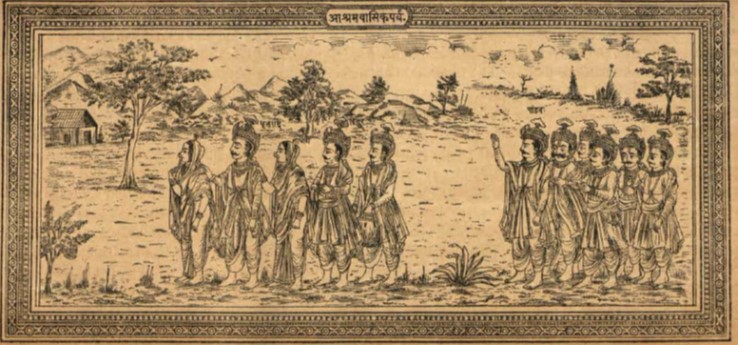Ashramavasika Parva
Kannada translation
15_AshramavasikaParva_19 May 2021
- ಆಶ್ರಮವಾಸ ಪರ್ವ: ಧೃತರಾಷ್ಟ್ರಶುಶ್ರೂಷಾ
- ಆಶ್ರಮವಾಸ ಪರ್ವ: ಧೃತರಾಷ್ಟ್ರಶುಶ್ರೂಷಾ
- ಆಶ್ರಮವಾಸ ಪರ್ವ: ಧೃತರಾಷ್ಟ್ರಶುಶ್ರೂಷಾ
- ಆಶ್ರಮವಾಸ ಪರ್ವ: ಭೀಮಾಪನಯ
- ಆಶ್ರಮವಾಸ ಪರ್ವ: ಧೃತರಾಷ್ಟ್ರನಿರ್ವೇದ
- ಆಶ್ರಮವಾಸ ಪರ್ವ: ಧೃತರಾಷ್ಟ್ರನಿರ್ವೇದ
- ಆಶ್ರಮವಾಸ ಪರ್ವ: ಧೃತರಾಷ್ಟ್ರನಿರ್ವೇದ
- ಆಶ್ರಮವಾಸ ಪರ್ವ: ವ್ಯಾಸಾನುಜ್ಞಾ
- ಆಶ್ರಮವಾಸ ಪರ್ವ: ಧೃತರಾಷ್ಟ್ರೋಪದೇಶ
- ಆಶ್ರಮವಾಸ ಪರ್ವ: ಧೃತರಾಷ್ಟ್ರೋಪದೇಶ
- ಆಶ್ರಮವಾಸ ಪರ್ವ: ಧೃತರಾಷ್ಟ್ರೋಪದೇಶ
- ಆಶ್ರಮವಾಸ ಪರ್ವ: ಧೃತರಾಷ್ಟ್ರೋಪದೇಶ
- ಆಶ್ರಮವಾಸ ಪರ್ವ: ಧೃತರಾಷ್ಟ್ರಕೃತವನಾಗಮನಪ್ರಾರ್ಥನ
- ಆಶ್ರಮವಾಸ ಪರ್ವ: ಧೃತರಾಷ್ಟ್ರಪ್ರಾರ್ಥನ
- ಆಶ್ರಮವಾಸ ಪರ್ವ: ಪ್ರಕೃತಿಸಾಂತ್ವನ
- ಆಶ್ರಮವಾಸ ಪರ್ವ: ಪ್ರಕೃತಿಸಾಂತ್ವನ
- ಆಶ್ರಮವಾಸ ಪರ್ವ: ಭೀಮಸೇನವಾಕ್ಯ
- ಆಶ್ರಮವಾಸ ಪರ್ವ: ಯುಧಿಷ್ಠಿರಾನುಮೋದನ
- ಆಶ್ರಮವಾಸ ಪರ್ವ: ವಿದುರವಾಕ್ಯ
- ಆಶ್ರಮವಾಸ ಪರ್ವ: ದಾನಯಜ್ಞ
- ಆಶ್ರಮವಾಸ ಪರ್ವ: ಧೃತರಾಷ್ಟ್ರನಿರ್ಯಾಣ
- ಆಶ್ರಮವಾಸ ಪರ್ವ: ಕುಂತೀವನಪ್ರಸ್ಥಾನ
- ಆಶ್ರಮವಾಸ ಪರ್ವ: ಕುಂತೀವಾಕ್ಯ
- ಆಶ್ರಮವಾಸ ಪರ್ವ:
- ಆಶ್ರಮವಾಸ ಪರ್ವ: ಶತಯೂಪಾಶ್ರಮನಿವಾಸ
- ಆಶ್ರಮವಾಸ ಪರ್ವ: ಶತಯೂಪಾಶ್ರಮನಿವಾಸ
- ಆಶ್ರಮವಾಸ ಪರ್ವ: ನಾರದವಾಕ್ಯ
- ಆಶ್ರಮವಾಸ ಪರ್ವ:
- ಆಶ್ರಮವಾಸ ಪರ್ವ: ಯುಧಿಷ್ಠಿರಯಾತ್ರಾ
- ಆಶ್ರಮವಾಸ ಪರ್ವ: ಧೃತರಾಷ್ಟ್ರಾಶ್ರಮಗಮನ
- ಆಶ್ರಮವಾಸ ಪರ್ವ: ಯುಧಿಷ್ಠಿರಾದಿಧೃತರಾಷ್ಟ್ರಸಮಾಗಮ
- ಆಶ್ರಮವಾಸ ಪರ್ವ: ಋಷಿನ್ ಪ್ರತಿ ಯುಧಿಷ್ಠಿರಾದಿಕಥನ
- ಆಶ್ರಮವಾಸ ಪರ್ವ: ವಿದುರನಿರ್ಯಾಣ
- ಆಶ್ರಮವಾಸ ಪರ್ವ: ವ್ಯಾಸಾಗಮನ
- ಆಶ್ರಮವಾಸ ಪರ್ವ: ವ್ಯಾಸವಾಕ್ಯ
- ಪುತ್ರದರ್ಶನ ಪರ್ವ: ಧೃತರಾಷ್ಟ್ರಾದಿಕೃತಪ್ರಾರ್ಥನ
- ಪುತ್ರದರ್ಶನ ಪರ್ವ: ವ್ಯಾಸಕುಂತೀಸಂವಾದ
- ಪುತ್ರದರ್ಶನ ಪರ್ವ: ವ್ಯಾಸಕುಂತೀಸಂವಾದ
- ಪುತ್ರದರ್ಶನ ಪರ್ವ: ಗಂಗಾತೀರಗಮನ
- ಪುತ್ರದರ್ಶನ ಪರ್ವ: ಭೀಷ್ಮಾದಿದರ್ಶನ
- ಪುತ್ರದರ್ಶನ ಪರ್ವ: ಸ್ತ್ರೀಣಾಂ ಸ್ವಸ್ವಪತಿಲೋಕಗಮನ
- ಪುತ್ರದರ್ಶನ ಪರ್ವ: ಜನಮೇಜಯಂ ಪ್ರತಿ ವೈಶಂಪಾಯನವಾಕ್ಯ
- ಪುತ್ರದರ್ಶನ ಪರ್ವ: ಜನಮೇಜಯಸ್ಯ ಸ್ವಪಿತೃದರ್ಶನ
- ಪುತ್ರದರ್ಶನ ಪರ್ವ: ಯುಧಿಷ್ಠಿರಪ್ರತ್ಯಾಗಮ
- ನಾರದಾಗಮನ ಪರ್ವ: ದಾವಾಗ್ನಿನಾ ಧೃತರಾಷ್ಟ್ರಾದಿದಾಹ
- ನಾರದಾಗಮನ ಪರ್ವ: ಯುಧಿಷ್ಠಿರವಿಲಾಪ
- ನಾರದಾಗಮನ ಪರ್ವ: ಶ್ರಾದ್ಧದಾನ
Structure
Ashramavasik Parva (Sanskrit: आश्रमवासिक पर्व), or the "Book of Hermitage", is the fifteenth of eighteen books of the Indian epic Mahabharata. It has 3 Upa Parvas (sections) and 47 Adhyayas (chapters).
- Ashramavasa Parva: (35 Adhyayas 1-35; 737 Shlokas)
- Putradarsana Parva: (9 Adhyayas 36-44: 234 Shlokas)
- Naradagamana Parva: (3 Adhyayas 45-47; 91 Shlokas)
Summary
Ashramvasik Parva describes 15 years of prosperous rule by Yudhishthira after the great war. The Pandavas and Kauravas have lived in peace, with Yudhishthira consulting with Dhritarashtra on matters of governance. Draupadi becomes friends with Gandhari, Vyasa and other sages visit the kingdom with their fables and wisdom. The parva recites the next two years when Dhritarashtra and Gandhari take Sannyasa and live a hermit's life in a forest.
After 15 years of peaceful co-existence, Dhritarashtra and his wife seek sannyasa (renunciation of domestic life for moksha). They leave the kingdom and head into the forest to Vyasa's hermitage. Yudhishthira attempts to dissuade them, but they insist on completing their fourth period of ashrama life. Kunti, Sanjaya and Vidura join them in the hermitage. Vidura was the first to die. After two years of hermit life, all three - Kunti, Dhritarashtra and Gandhari - too pass away, in a forest fire. The news of their death causes grief to Pandavas and citizens of the kingdom. Sage Narada appears and consoles them. Yudhishthira performs Shraddha rites for those who had died at the hermitage.
Let thy judicial officers, O Yudhishthira, inflict punishments on offenders, according to the law, after careful determination of the gravity of the offenses.
— Dhritarashtra, Ashramvasika Parva, Mahabharata Book xv.5
He who knows himself attains the highest understanding and becomes freed from error,
All creatures appear from an invisible state, and once more disappear into invisibleness.He enjoys, or endures, the fruits of all his act, where he does them,
If the act be a mental one, its consequences are enjoyed, or endured, mentally;
If it is done with the body, its consequences are to be enjoyed, or endured, in the body.— Vaishampayana, Ashramvasika Parva, Mahabharata Book xv.34